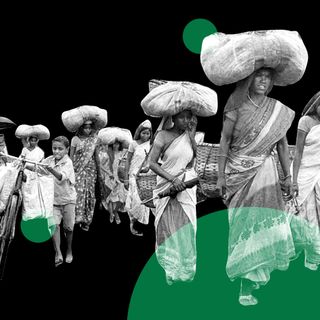Women who refuse to serve alcohol at their weddings will receive a reward of Rs 10,001, in a new initiative announced by police in Uttarakhand’s Devprayag. The scheme is one more in a series of steps authorities in the state have attempted to curb pervasive overconsumption of alcohol and related crimes.
Uttarakhand has had a prominent anti-alcohol movement since the 1970s. An Uttarakhand High Court order in 2019 had asked the government to make policy decisions on liquor ban, seeing how a PIL stated it was affecting lives in the state. Now-dry districts are the result of grassroot anti-alcohol movements that sprang from a boom in liquor stores catering to under- or unemployed in the 60s.
This initiative, taken under the ‘Bhuli’ (sister) Kanyadan scheme, specifically targets boozy wedding parties in rural areas, with the reward money pooled in by the staff of the police station.
According to the police, there has been a rise in alcohol-fueled crime, primarily cases of harassment of women, brawls, and domestic violence.
Related on The Swaddle:
Companies are Rebranding Indigenous Liquors Like Mahua Into Desi Cocktails. Who Stands To Gain?
The police see the initiative as tackling class inequality, as well: Conventional practices in the villages dictate that wedding organisers —usually the bride’s family—pay local residents who help out during the wedding with liquor instead of money. This pressures economically weaker families to spend an exorbitant amount of money to match others, often putting them under debt. According to the New Indian Express, village weddings typically spend as much as Rs. 15,000 just on liquor.
Anti-alcohol activists in the past have organised events such as foot marches to demand the Uttarakhand government promote anti-liquor activism. They view the problem of overconsumption as a symptom of predatory “development” and the means by which commercialisation has seeped into village societies. As a result of this activism, alcohol is prohibited completely in several Uttarakhand districts and available only with a permit in some others.
“After mulling various steps that can be taken to stop the youth from consuming alcohol, we felt that it would be great if women raise their voice against this malpractice,” said Mahipal Singh Rawat, station officer of Devprayag police station. Women have borne the brunt of the sale of alcohol in the state — a study from 2015 stated that every second woman in the state faced domestic violence, with alcohol as one of the biggest causes. Thus, they have been leaders in the anti-alcohol movement, using innovative methods to discourage consumption, such as using stinging grass to prick people who queue up to buy alcohol. In January, a village in Uttarakhand passed a resolution led by women banning the sale, distribution, and serving of alcohol at wedding ceremonies and other socio-religious gatherings like fairs. Similarly, in March last year, women in another village decided to ban liquor in their block of the district after seeing a rise in youth consumption.
The police also added that in the hilly areas of the state, wedding parties with copious alcohol were never the norm, but have become commonplace due to urbanisation. They say they hope their initiative will also inspire locals to focus more on traditional rituals.




